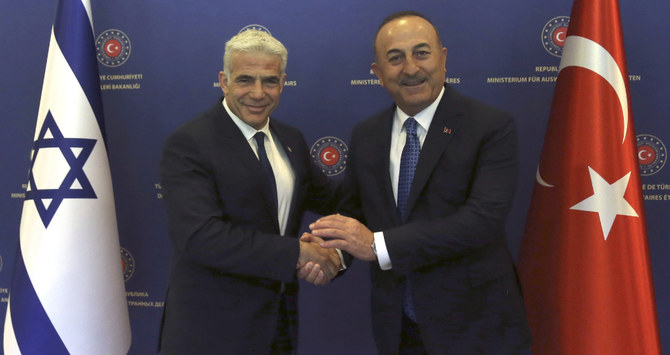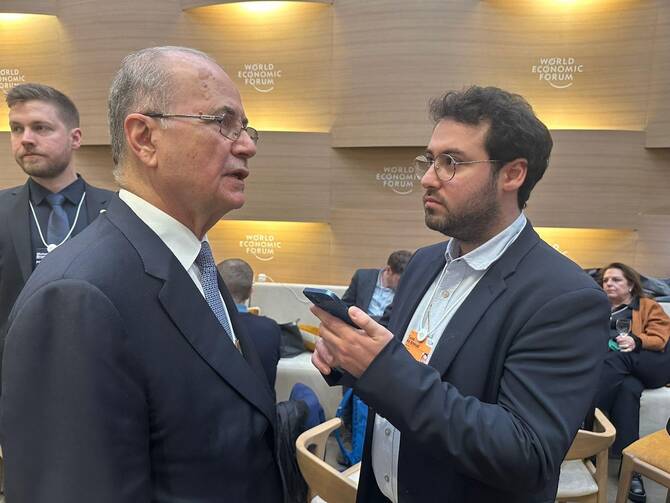ANKARA: Israel and Turkey have announced the upgrading of diplomatic relations and the return of their ambassadors and consuls general after years of strained ties between the two nations.
Israeli Prime Minister Yair Lapid greeted such a diplomatic breakthrough as an “important asset for regional stability and very important economic news for the citizens of Israel.
According to Dr. Nimrod Goren, president of the Mitvim Institute and co-founder of Diplomeds — The Council for Mediterranean Diplomacy — the announcement on the upgrading of ties marks a diplomatic success.
"It is the culmination of a gradual process that has taken place over more than a year, during which Israel and Turkey have worked to rebuild trust, launch new dialogue channels, adopt a positive agenda, re-energize cooperation, confront security challenges, and find ways to contain differences," Goren told Arab News.
“Based on these positive developments, restoring relations at the ambassadorial level is now seen as a natural step, perhaps even a long overdue one,” he said.
“It was important to seal this move before internal politics gets in the way, as elections in both countries are drawing near,” Goren added.
Goren said that the timing also “coincides with efforts by both Israel and Turkey to improve and deepen their various relationships in the region.”
Turkey and Israel, once regional allies, expelled their ambassadors in 2018 over the killing of dozens of Palestinians by Israeli forces during protests along the Gaza border.
Relations were completely frozen after the death of nine Turkish activists over an Israeli raid on the Gaza-bound Turkish Mavi Marmara ship in 2010.
Since then, many attempts have been made to mend ties, especially in the energy sector, and in trade and tourism, which emerged as strategic avenues for cooperation.
Turkish President Recep Tayyip Erdogan and Israeli President Isaac Herzog have spoken on the phone several times and Herzog visited Ankara last March.
As part of mutual trust-building efforts, Turkish Foreign Minister Mevlut Cavusoglu also visited Jerusalem in May, marking the first visit to Israel by a Turkish foreign minister in 15 years. His visit was reciprocated by Lapid, then Israeli foreign minister, in June.
The two countries also cooperated in counter-terrorism efforts following Iranian assassination plots against a Turkish-Israeli businessperson as well as Israeli tourists in Istanbul. Turkey took steps to curtail the movements of Hamas within the country.
They also signed a civil aviation agreement last month.
Dr. Gokhan Cinkara, an expert from Necmettin Erbakan University, thinks that shifts in regional geopolitics are the main determinants for Turkey’s new efforts for normalization.
“The competition between status quo and revisionism in the region is over. Consequently, every country has alternatives and can be replaced, which is also the case for Turkey. Due to the economic crisis and geopolitical deadlock that the country is passing through, it was inevitable for Turkey to search for new options,” he told Arab News.
“The appointment of diplomats will ensure that bilateral relations will continue to operate under an institutional routine.”
The ambassador to Israel is expected to be appointed soon. Both countries are also set to hold a joint economic commission meeting in September.
However, Turkish Foreign Minister Cavusoglu said that Ankara would continue to support the Palestinian cause.
“Despite the new chapter in relations, Israel and Turkey still have differences of opinion on key policy issues, including Israeli-Palestinian relations and the Eastern Mediterranean,” Goren said.
“These differences will not go away, but Israel and Turkey are aware of the need to be sensitive in how they deal with them and to put in place bilateral mechanisms to regularly engage on these issues,” Goren said.
“If Israel and Turkey can somehow support each other on the road to conflict resolution with third countries (e.g., Turkey with Egypt, Israel with the Palestinians) — that will be a major benefit of the new chapter in ties.”
As bilateral relations have been moving on a positive trajectory since Israeli President Herzog’s visit to Ankara, Selin Nasi, London representative of the Ankara Policy Center and a respected researcher on Turkish Israeli relations, pointed to the timing of the envoy exchange.
“The Israeli side has been taking the process a bit slowly in order to understand whether Ankara was sincere in its efforts to mend fences,” she told Arab News.
Ankara’s “calm and measured response in the face of tensions in Jerusalem and in Gaza in the last couple of months and its full cooperation with Israeli intelligence against Iranian plots which targeted Israeli citizens in Turkey have seemingly reassured Israel’s concerns,” she said.
Nasi thinks that the ambassadorial exchange shows Turkey and Israel’s willingness to give the normalization process a formal framework, as well as their readiness to move to the next phase.
“Considering the upcoming elections in Israel in November, normalization of diplomatic ties is likely to provide a shield against the interference of domestic politics,” she said.
Although Turkey and Israel have managed to turn a new page in bilateral relations, Nasi thinks that it is equally important to see what they are going to write in this new chapter.
“Both countries have a lot to gain from developing cooperation at a time when the US is shifting its focus and energy to the Pacific region and Iran is about to become a nuclear power,” she said.
“On the other hand, the Russian invasion of Ukraine has put energy security front and center once again. It revived hopes that the pipeline project that would carry Israeli natural gas via Turkey could be eventually realized,” she said. “While the unsettled Cyprus question remains the elephant in the room, it all comes down to the sides’ mending political trust. We may therefore see some openings in the future.”
Goren thinks that a relaunching of the Israel-Turkey strategic dialogue and the resumption of regular high-level contacts will also assist the countries lessen mutual misperceptions — related, for example, to Israel’s ties with the Kurds and Turkey’s ties with Iran — and avoid gaps in expectations.
“Israel and Turkey should make sure that this time — unlike what happened in the previous decade — their upgrade of ties will be sustainable and long-term,” Goren said.
The exchange of ambassadors has been also welcomed by the US.
“Today’s announcement that Israel and Turkey are fully restoring their diplomatic relations. This move will bring increased security, stability, and prosperity to their peoples as well as the region,” tweeted Jake Sullivan, national security adviser at White House.
Nasi also said that Turkey’s relations with Israel “have always been a factor of its relations with the West and with the US in particular. In the backdrop of the ongoing war in Ukraine, Ankara has been threading a fine path with Russia.”
Nasi said “normalization of ties with Israel may aim to send a message to the US Congress, whose favorable view and support on the modernization of F16s is very much sought for.”
















